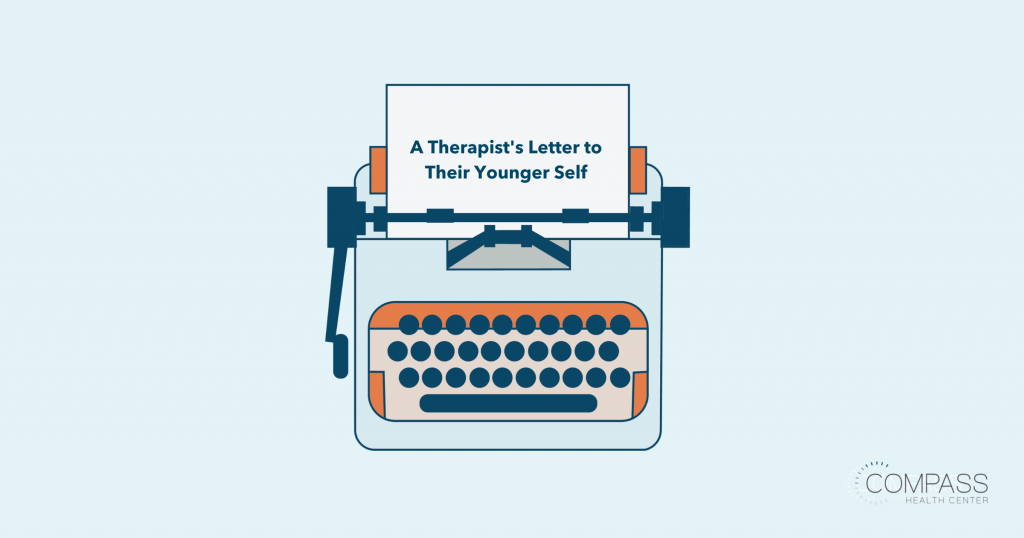In this multi-part series, Compass asked clinicians to reflect upon their youth and write letters to their younger selves. We hope you find some inspiring or helpful tidbits of information as you head into the fall.
Dear younger self,
It’s almost fall, and with the change of the season comes that familiar change of pace that comes from returning to school. You might be excited about one or two classes and thrilled to be in a bunch of classes with two of your best friends. At the same time, you might be dreading the return to an earlier morning schedule and loathing the required math class that you’ll have to take. The feelings and the worries might come at you superfast and even change daily – sometimes you might be experiencing so many things at once that it’s hard to really know how you feel. And while all that’s happening inside, there’s all those pressures from the outside. Maybe your parents are pushing you to get a part-time job after school, or friends want you to join a new club with them, or teachers are sending out their syllabi before the school year even begins and pushing you to start studying already. Maybe it’s all of those at once! The inside stuff and the outside stuff add up to be really overwhelming, especially when you top it all off with the unknowns that come with the start of a new year. Worse sometimes, is the nagging feeling that you can’t do anything about the stress, and you just have to just push through it all. What I wish I would have known is that there were other ways to deal with all of that stress that weren’t just the “grin and bear it” method. I wish I had known that:
It’s ok to feel however you’re feeling. You might experience a lot of judgement from yourself, or maybe even from other people when you express an emotion, but that judgment isn’t fair. Emotions are often very automatic – they happen when our body is trying to communicate something to us. Anger might be a response to someone crossing one of our boundaries. Sadness might let us know that we are missing something or someone. Anxious excitement can tell us that we really care about the outcome of an upcoming event. As a result, there are no good and bad emotions – emotions help our bodies and our conscious minds communicate. We need all our emotions to help us understand our goals, values, and boundaries. Even though it doesn’t always feel great, our emotions give us really important information, and we can’t just pick and choose which ones are important. If we try to dull the negative ones, we also numb the positive ones! It’s important to let ourselves feel painful emotions so that we can enjoy the pleasant ones too.
Sometimes your thoughts can (and will) be annoying, frustrating, or even downright hurtful. The thing is a lot of thoughts are automatic too, especially the negative ones. Most of us have heard some criticism at some point when we were young, and our brains, as a way to avoid more criticism, turn critical feedback into an internal thought. It’s our brain’s way of trying to protect us from repeating mistakes, but it doesn’t always work as intended – sometimes those thoughts make us feel way worse. It’s really frustrating to be feeling stressed out and overwhelmed, and then to have our own minds getting judgmental about how we’re feeling. Try to remember that those judgy thoughts are just that – thoughts. Your thoughts are not all of who you are. We all have them, though some of us do experience more of those automatic negatives than others. The good news is that we can learn ways to minimize their impact. The next time you have a negative thought about who you are, call it what it is: it’s a thought, not a fact. Those thoughts don’t define you, and there’s ways to help quiet them down a bit too.
One of the ways we can manage some of the more painful thoughts or emotions we have is to stay flexible with our self-care. It might be helpful to try something soothing, like hanging out with a pet or doing some journaling. Writing can get you through a lot of tough moments. Getting thoughts and feelings down helps you sort them out and de-jumble them. Other times, doing the opposite of what you want to do really helps. If you’re super mad, listening to calmer music or going for a walk might help cool that anger off a little bit. If you’re feeling sad or lonely and not wanting to talk to anyone, reaching out to a friend might make you feel better than hiding out in your room. Learning what works for you is a process, and that’s what makes that flexibility so important. Different things might help on different days, so giving a few things a try can help us find what works best. There will be some days where you just feel down, even after trying out some different strategies, and that’s ok too. The goal isn’t necessarily to get rid of weird or bad feelings, but to get through them.
On the days when you’re feeling down and nothing you’re doing seems to help, reach out to the people you trust. I would bet there are people that want to be there for you, even if you don’t know it. There’s a teacher that cares about you, a parent who has your back, or a friend that really wants to support you. Sometimes it can even help to talk to someone who’s really good at advice and support, like a coach, guidance counselor, or therapist. It can be hard to put the negative things into words, and sometimes it just helps to be with someone who cares. And it’s a powerful thing when you can talk out the emotions you’re going through. It might feel like that’s admitting that you’ve messed up or can’t handle everything going on right now, but it’s really the opposite! It takes a lot of insight and even some bravery to talk about the things we’re struggling with. Naming the feelings and thoughts, whatever they might be, might take a little of their power away too, and make harder days just a little bit easier to get through. I remember that I felt really pressured to figure everything out on my own when I was in high school.
I think this is the thing I wish I had known the most – that I didn’t have to do it all by myself, and neither do you.
Have a great year!
Meg Seth-Smith, LPC, NCC, Intake Therapist, Compass Virtual







